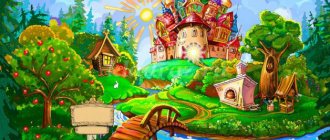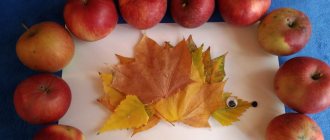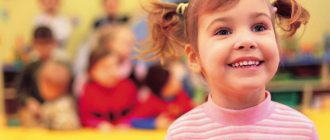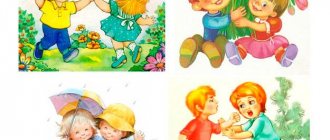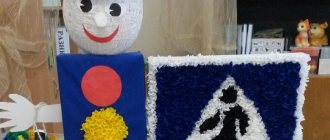Calendar planning in the senior group “What a delight these fairy tales are!”
Tatyana Vladimirovna Gorbatovskaya
Calendar planning in the senior group “What a delight these fairy tales are!”
This publication is a continuation of the topic “Journey to the Past. How they lived in Rus'." I would be grateful for interesting comments.
1. Examination of illustrations for familiar fairy tales . Goal: to develop the ability to carefully examine illustrations.
2. Physical exercise “Teremok”. Goal: to develop the ability to move in accordance with the text, to learn words.
4. Structural-model activity “Teremok”. Goal: to recall design techniques, develop collective construction, the ability to negotiate and distribute responsibilities.
5. Telling the fairy tale “The Cockerel and the Bean Seed.” Purpose: to discuss the behavior of the characters, to prepare for the dramatization.
6. Reading p. n. With. "Sivka Burka"
Goal: acquaintance with a new
fairy tale , identifying the features of the construction of a fairy tale , comparing it with “Little Red Riding Hood”
.
8. Examination of the painting “Fox in a Sundress.” Purpose: to consolidate knowledge about Russian costume.
9. Examination of illustrations for the fairy tale “Baba Yaga”. Purpose: to find out how the artist conveyed the state of the characters.
10. D/i “Which fairy tale is the hero ?” Goal: remember with children the names of Russian folk tales .
11. Entertainment “Visiting a fairy tale. ” Goal: develop interest in Russian fairy tales , cultivate love for your homeland.
12. Exercise “Recognize the hero of a fairy tale by description ”
(To develop the ability to name the hero
of a fairy tale according to his characteristic features, descriptions, to cultivate self-control).
13. Exercise “Name the heroes of the fairy tale ”
(Teach children to guess
the fairy tale according to the words of the main character, and then name the rest of the heroes of the fairy tale ).
14. D/i “Who Lives Where”
(consolidating knowledge of Russian folk
tales “Teremok”
and
“Zimovye”
, consolidating the concepts of
“domestic and wild animals”
). It is necessary to place the proposed animals in the house and winter quarters.
15. “Name the fairy tale based on the main character ”
(development of reaction speed, activity, independent thinking, learning to name
a fairy tale by character ). Images of fairy tale , children name in which fairy tales they appear . For example: rooster - “Zhikharka”
,
“Zayushkina’s Hut”
,
“Winter Move”
,
“Cat, Rooster and Fox”
, etc.
16. “Tell a fairy tale using illustrations ”
(encourage children to
retell a familiar fairy tale ; create conditions for creative expression)
Children put the pictures in order and tell the content of the fairy tale .
19. "Color the fairy tale "
(to improve children’s ability to color without going beyond the contours, the development of creativity, fine muscles of the fingers).
22. Guessing riddles from fairy tales .
24. Coloring on the theme “ Fairy Tales ”
.
Examination of illustrations for fairy tales by different artists .
25. “Let's tell a fairy tale ” - develop in children the desire and ability to dramatize their favorite fairy tale , convey the character of the characters, their facial expressions, gestures
26. Didactic game “Find out the fairy tale from the illustrations ”
- consolidate knowledge of the content of
fairy tales , develop memory, imagination, thinking, speech.
27. Speech development Topic: “Journey through Russian folk tales ”
Goals: To clarify and enrich children’s knowledge about oral folk art and the works of Russian writers. Learn to recognize a fairy tale by assignment . Learn to convey the structure of a fairy tale using modeling. Enrich children's vocabulary with expressions of verbal politeness. Exercise your ability to guess fairy tales , riddles, and remember the order in which heroes appear in fairy tales . Practice selecting adjectives with the opposite meaning of a noun.
29. Examination of reproductions of paintings by illustrators.
31. Exhibition of books - fairy tales with colorful illustrations containing magical objects
32. Conversation “These wise Russian fairy tales !”
Information and creative project “What a delight these fairy tales are!” (second junior group) Information and creative project “What a beauty these fairy tales are!” Second junior group Developed by teacher: Yakusheva Tamara Vladimirovna.
Long-term project “What a beauty these fairy tales are...” Type of project: creative, long-term. Project participants: preschool teachers, children, parents. Project duration: September 2021 to May 2017. Relevance:.
Summary of a lesson on speech development in the middle group “What a delight these fairy tales are” Summary of a lesson on speech development in the middle group “What a delight these fairy tales” Purpose: to identify the level of grammatical development.
Literary lotto “What a delight these fairy tales are” To play you need: 6 beautifully decorated envelopes with numbers from 1 to 6, a hexagon cube with numbers from 1 to 6, tokens, books for the winners.
Presentation of the creative project “What a delight these fairy tales are!” Presentation of the creative project “What a delight these fairy tales are!” A fairy tale enters a child’s life from a very early age and accompanies them.
Project “What a beauty these fairy tales are...” (second junior group) Project on the topic “What a beauty these tales are. » Fadeeva V.N. Venue: second junior group. Type of project: short-term – duration:.
Entertainment for children of the second junior group “What a delight, these fairy tales!” Goal: creating a joyful mood, a friendly environment for further communication. Program content: Educational objectives:.
Presentation for the lesson “What a delight these fairy tales are!” What fairy tales teach us Fairy tale - folk wisdom What is a fairy tale? What is the difference between a fairy tale and a short story? Who lives in fairy tales? How it begins.
Creative project “What a beauty these fairy tales are!” Creative project “What a beauty these fairy tales are.” Golyanova Svetlana Valerievna, teacher of the highest qualification category, Kopylova Elena.
Source
